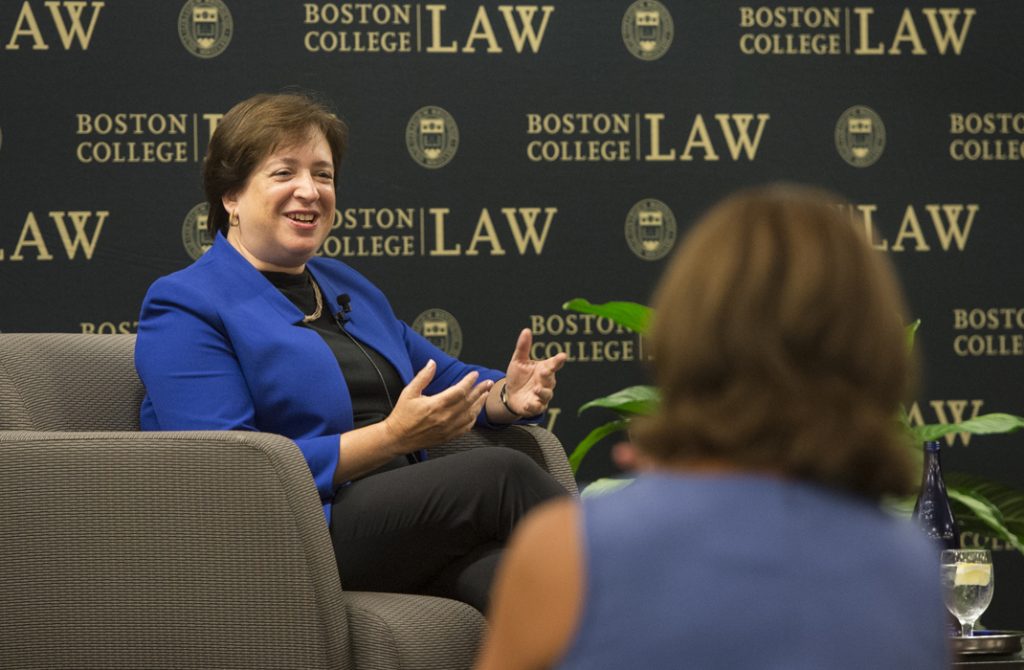On Friday, September 11, 2015, Supreme Court Associate Justice Elena Kagan visited Boston College Law School for a Q&A with Dean Vincent Rougeau (view video from the event below).
The conversation drew a capacity crowd of over three hundred people to the Law School’s Ropes & Gray Conference Room. Many more watched from video overflow rooms in the School’s East Wing building as Justice Kagan covered a wide range of topics, from women in the profession to legal writing skills to her experiences as a member of the nation’s highest court.
“We have great advocates,” she said. “I feel lucky every day when I walk into the courtroom.”
She said that being a justice means being able to move on from case to case, regardless of the decision.“They put us in this job to care about the issues that come before us. But you have to learn how to put it aside and pick up the next case and the next case after that. Sometimes I come back to my office after conference thrilled and sometimes I come back to my office after conference disconsolate.”
When asked about her experiences as a woman in the profession, Justice Kagan stressed that much had changed for the better during the past thirty years, but issues remain around work-life balance. “[There are issues] with making sure that women can have the family opportunities and career opportunities that they want at the same time,” she said. “And those issues, I think, still affect women differently than they do men and I think we have to work on that as a society.” She also stressed the importance of diversity on the court. “I sit up on the bench and I look out into the audience and a lot of school groups come to the court…and I think how great it is that all these kids are looking at this court and there are three women and an African American and a Latina.”
One of the most engaging parts of the discussion for the students in the room focused on the importance of legal writing skills. Justice Kagan spoke about her preference for writing as clearly and simply as possible, and even using humor on occasion in her opinions. While the Justice admitted that there may be a few lawyers who didn’t have to write much during their careers, that’s the exception rather than the rule.
“To be a world class lawyer you have to do a lot of writing and you have to be good at it,” she said. “Good writing is hard generally and good legal writing is harder than that—because a lot of legal concepts are complicated and arcane and not particularly intuitive to an audience, and figuring out how to convey these complicated and arcane ideas in a way that people can understand and in a way that sticks with people is something that I think every day I wish I could do better.”
BC Law professor Sharon Beckman, who clerked for Supreme Court Justice Sandra Day O’Connor and knew Justice Kagan personally during her time at the court, gave the introductions, and included anecdotes about playing basketball together on the top floor of the court building.
“For all of her elite accomplishments,” Beckman said, “she is one of the most down to earth people you will ever meet. Her warmth and good humor make everybody comfortable. How many justices have put Spiderman puns in their opinions?” Beckman went on to say that Justice Kagan “always understands and never loses sight of the law’s impact on actual people…I have never met another person so genuinely interested in what other people think and why they think it—and so open to considering others’ points of view as informing her own.”
During the second half of the session, the Justice took questions from the audience. “The keys to success are to work hard and to treat people well,” she said. Her frank advice to law students was to find something that deeply engaged them personally. “Too often law students don’t think quite hard enough about what really makes them happy and the work that is most meaningful to them. Use law school as an opportunity to find what your real interests and real passions are and then go with them.”
Watch Justice Kagan’s Q&A:


